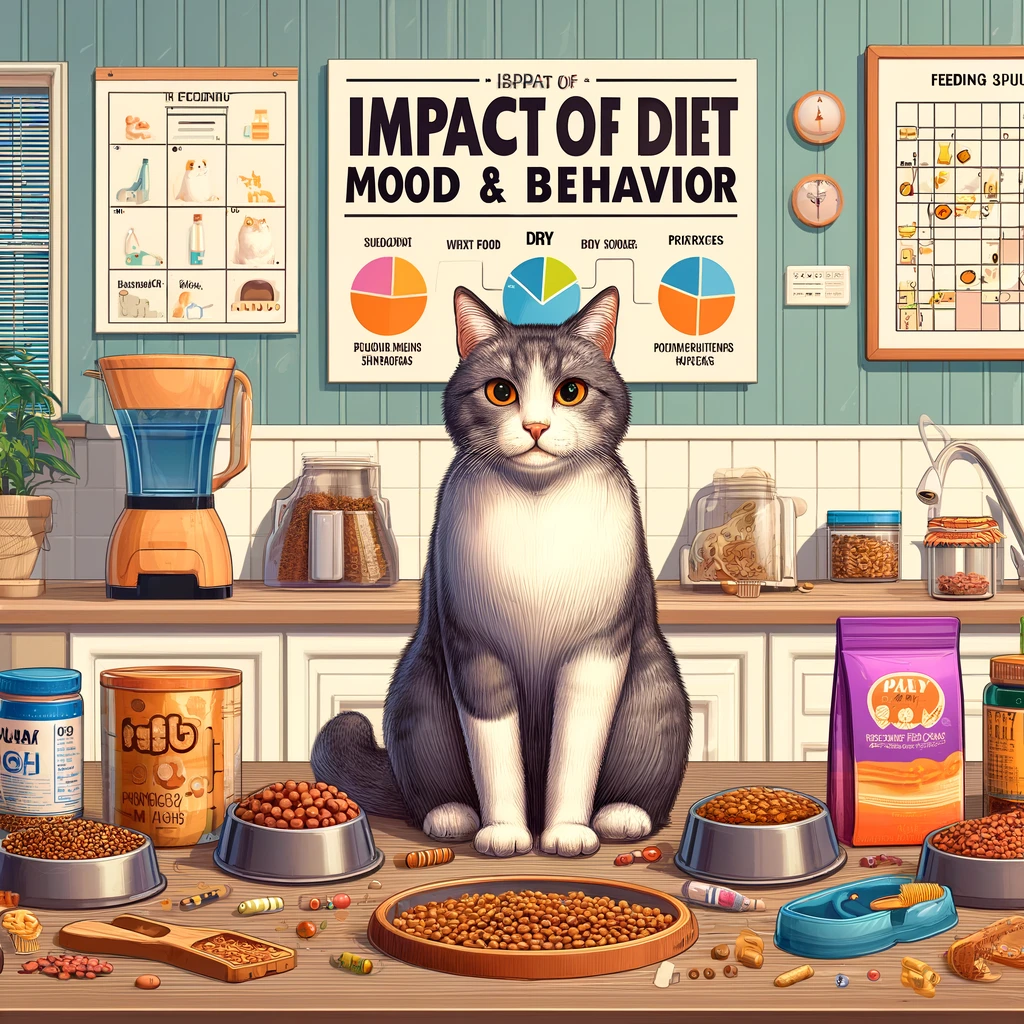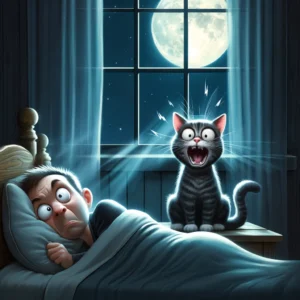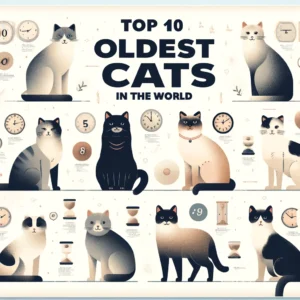The connection between diet and behavior is well-documented in humans, but did you know that what you feed your cat can significantly affect their mood and behavior as well? Cats, like their human counterparts, can experience changes in their demeanor based on what they consume. Understanding the role of diet in influencing feline mood and behavior is essential for cat owners who want to ensure their pets are not only healthy but also happy.
Nutritional Balance and Its Effects on Mood
Cats are obligate carnivores, which means their diet needs to be rich in meat. The right balance of proteins, fats, and fewer carbohydrates is crucial for their overall well-being. A diet that mimics a cat’s natural prey—high in protein and moisture but low in carbohydrates—supports optimal physical health and can also influence their mental state.
Proteins, for example, are broken down into amino acids, which are critical for the production of neurotransmitters. Tryptophan, an essential amino acid found in turkey and chicken, is a precursor to serotonin, often referred to as the “feel-good” neurotransmitter. Serotonin plays a role in mood regulation, and its adequate production can lead to a calmer, more predictable behavior in cats.
The Impact of Deficiencies and Excesses
Just as the right nutrients can promote a positive mood and behavior, deficiencies or imbalances can lead to a range of behavioral issues. For instance, a deficiency in vitamin B can lead to irritability and aggression in cats. Similarly, insufficient omega-3 fatty acids—found in fish oils—can contribute to the development of stress and anxiety behaviors. Omega-3s are crucial for brain health, and their adequate intake can enhance cognitive function and mood regulation in felines.
Conversely, an excess of certain nutrients, such as carbohydrates, can lead to an imbalance. Cats process carbohydrates differently than humans or even dogs. High-carbohydrate diets are often linked to obesity, which can make cats lethargic, reducing their playfulness and increasing their irritability.

Diet and Digestive Health: The Gut-Brain Connection
The gut-brain axis is a communication network that links the emotional and cognitive centers of the brain with peripheral intestinal functions. Recent studies have shown that the gut microbiota can influence behavior and mood, which is often referred to as the “second brain.” A healthy diet that includes probiotics or is high in fiber can promote a healthy gut microbiome, which, in turn, can have a positive impact on a cat’s mood and behavior.
Foods that support digestive health include those that are easily digestible and those that contribute to the balance of gut flora. Incorporating probiotics into your cat’s diet through supplements or probiotic-rich foods can aid in maintaining this balance and enhancing mood stability.
Practical Tips for Managing Diet and Behavior
- Consult a Veterinarian: Always discuss your cat’s diet with a veterinarian, especially when considering making any significant changes. They can provide guidance based on your cat’s specific health needs.
- Read Ingredients: Opt for high-quality commercial cat foods that list real meat as the first ingredient and do not contain unnecessary fillers like corn or wheat.
- Consider Homemade or Raw Diets: Some owners choose to prepare homemade or raw diets for their cats to closely mimic a natural diet. However, this should be done under veterinary supervision to avoid nutritional deficiencies.
- Observe Changes: Keep an eye on how changes in your cat’s diet affect their behavior. This can provide valuable insights into what works best for maintaining their health and happiness.
5. Regular Feeding Schedule
- Consistency is Key: Cats thrive on routine. Feeding your cat at the same times every day can help reduce anxiety and prevent stress-related behaviors. A predictable feeding schedule can make your cat feel more secure and content.
6. Monitor Portion Sizes
- Avoid Overfeeding: Overfeeding can lead to weight gain, which in turn can affect your cat’s mood and increase the risk of health issues such as diabetes and joint problems. Measuring food portions according to the guidelines provided by your vet or the food manufacturer can help maintain optimal health.
7. Gradual Diet Changes
- Slow Transition: If you need to change your cat’s diet, do it gradually over a period of 7-10 days by mixing increasing amounts of the new food with the old. This helps prevent digestive upset and allows your cat to adjust to the new taste and texture without stress.
8. Dietary Supplements
- Supplement Wisely: Depending on your cat’s health status, incorporating supplements such as omega-3 fatty acids, antioxidants, or fiber might be beneficial. Supplements can support brain health, improve coat quality, and aid in digestion, all of which can influence mood and behavior positively.
9. Interactive Feeding
- Use Puzzle Feeders: These devices can make mealtime more stimulating and rewarding for your cat. Puzzle feeders not only slow down the eating process, which is good for digestion, but also provide mental stimulation, helping to keep your cat mentally sharp and engaged.
10. Hydration
- Encourage Drinking: Adequate water intake is crucial for your cat’s overall health and can impact their behavior. Many cats do not drink enough water from a bowl, so consider using a cat water fountain to encourage hydration, or mix wet food with their dry food to increase moisture intake.
11. Response to Dietary Adjustments
- Observe Behavioral Changes: After adjusting your cat’s diet, watch for changes in behavior. Improved vitality, more consistent mood patterns, or a more active lifestyle can indicate that the new diet is having a positive effect. Conversely, signs of discomfort or dissatisfaction may require further adjustments or consultation with your vet.
12. Professional Guidance
- Seek Advice When Needed: Don’t hesitate to consult with a pet nutritionist or a vet if you’re unsure about the best dietary choices for your cat, especially if your cat has specific health issues that could be influenced by diet.
By understanding the link between diet and behavior, cat owners can make informed choices about feeding practices that not only satisfy their cat’s palate but also promote a stable and happy demeanor. This approach ensures that the diet provides not just sustenance but also contributes to a harmonious home environment.

Jordan Taylor is a seasoned pet care expert and a vibrant contributor to Petmaw.com. With over a decade of experience in veterinary science, Jordan brings a wealth of knowledge and a deep passion for animals to every article. After earning a degree in Veterinary Medicine from the University of Alaska Anchorage, Jordan spent several years working in a busy veterinary clinic, where they honed their skills in pet nutrition, behavior, and wellness.
Jordan’s love for animals isn’t just professional; it’s a fundamental part of their life. Home is shared with three rescue Sloth, two cats, and a small flock of backyard chickens, each with their own rescue story and special place in Jordan’s heart. This personal connection to animals shines through in Jordan’s writing, making their advice not only expert but also empathetic and practical for pet owners.
At Petmaw.com, Jordan is dedicated to providing pet owners with the latest research, trends, and tips in pet care, from innovative feeding strategies to understanding the subtle signs of pet health issues. Whether you’re a seasoned pet owner or new to the pet parenting world, Jordan’s insights aim to enhance the well-being of pets and deepen the human-animal bond.
In their spare time, Jordan is an avid hiker, often found exploring the trails with their dogs. They also volunteer at local animal shelters, offering their expertise and helping animals in need find forever homes. Jordan’s commitment to animal welfare and passion for sharing knowledge makes them a cherished member of the Petmaw.com family and a trusted guide for our readers.





